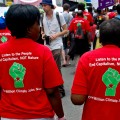Secret Meetings to Help Finance?
Holly Jones | December 7, 2012.

The United States is blocking progress on finance discussions at the UN climate change conference in Doha, Qatar by being unable to announce future financial commitments. Blame for inaction is being placed upon President Barak Obama and US negotiators present at COP18, however the real culprit is the US Congress.
In a Climate Action Network International press conference Steve Herz, of the Sierra Club, said the main blockage in the long-term co-operative action negotiating stream is climate finance. “The US risks snatching defeat from the jaws of victory if it keeps blocking action on finance in these talks because it risks bringing down the Durban Platform for a new deal which Washington fought so hard for last year.”
A sticking point is the question that remains around Fast-Start Financing. Created out of the Copenhagen Accord in 2009, it was developed with the idea that developed countries would pledge $30 billion towards climate financing between 2010-2012. This is considered to be preparation for the Green Climate Fund, a long-term source of climate funding to be launched in 2015. Since inception, the US has committed $7.5 billion to date. There is yet to be any mention of future financing options.
When asked about future finance commitments, US negotiator Jonathan Pershing, indicated that he is unable to make pledges until Congress moves on the national budget.
Without appropriations – money being set aside – from Congress, Pershing and the rest of the US delegation aren’t able to give specific financial commitments. Congress is in the of middle of budget debates centered around tax rates with a ‘fiscal cliff’ looming in the near future if budget decisions fail. Clarity on the US budget will mean clarity on finance issues at COP18.
Countries and NGOs alike have been criticising the US for preventing discussions around how the $100 billion a year target will be met for the Green Climate Fund by 2020. Multiple sources have confirmed to The Verb, that there is a small glimmer of hope as the US has engaged some current major donor countries in secret bilateral meetings, as.
This particularly negotiating track will be closing in Doha, not to be continued in Warsaw, Poland next year. The US must make some form of commitment if it wants to remain in favour with any developing nations. With their hands tied back home, the US is expected to make a move similar to Copenhagen – rhetoric without a specific pledge.
By Holly Jones, photo by Laura Owsianka.











comment